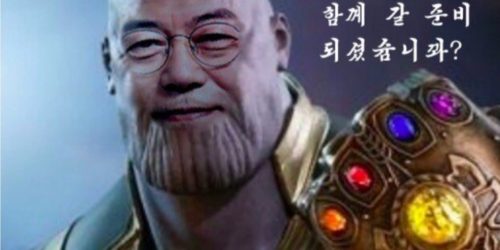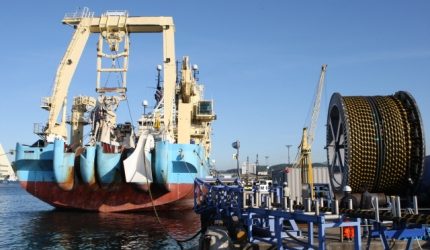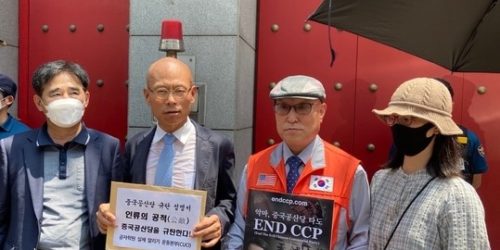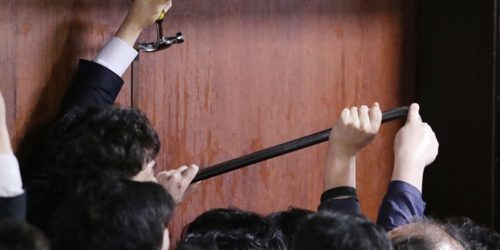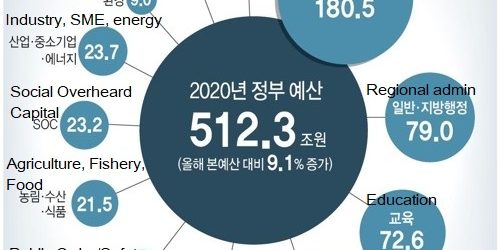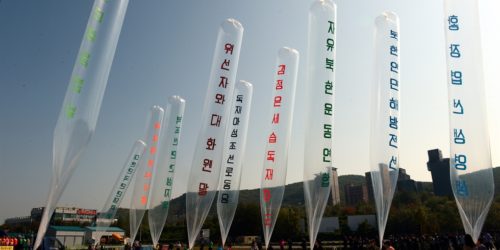Moon Jae-in Administration Investigates Its Chief Inspector after Producing a Report Not Supporting Moon’s “Nuclear Energy Exit,” a Policy which Benefits China and Russia
2020-11-25, Tara O
Prosecutors began investigating Korea’s chief inspector Choi Jae-hyeng (최재형) on November 18, 2020 after he and his team produced a report that weakened the rationale for the Blue House to pursue more closures on the country’s nuclear power plants, in this case Wolseong Unit 1. The inspection lasted more than a year.
One of the first policy priorities for the Moon Jae-in administration was “nuclear energy exit” (탈원전)–phasing out nuclear energy from South Korea–which was announced shortly after Moon’s inauguration in May 2017. As South Korea relies on nuclear energy–the cheapest and cleanest source of energy–for 1/3 of its energy requirements, the sudden announcement puzzled the public. Accordingly, the Moon government has been pursuing shutting down South Korea’s nuclear power plants, despite opposition from nuclear specialists, energy experts, and citizens.
Moon Jae-in, then the leader of Democratic Party of Korea (Deobureo Minjoo Party), made his position clear in December 2016 after he watched a movie “Pandora,” which showed workers suffering from radiation poisoning, and stated, “I cried a lot as I was watching the movie…Let’s make a nuclear weapons-/nuclear energy-free country.” Greenpeace admitted it funded screening of the movie, street protests, and lawsuits.
Once South Korea, which exports nuclear power plants and operations with perhaps the highest safety standards in the world, is removed from the competition, China and Russia, would benefit greatly as the only two countries competing in the world market to build new nuclear power plants, but also raises serious safety concerns.
A group of 417 professors from 60 South Korean universities demanded the South Korean government “immediately halt the push to annihilate the nuclear energy industry, which could lead to an increase in the burden on livelihoods, unstable power supply and demand, weakening industrial competitiveness, the outflow of energy, and an energy security crisis,” stating “Nuclear power…has provided for the welfare of the general people through cheap electricity.” They added that 92,000 jobs per year would be lost under the “nuclear energy exit” policy.
This policy also directly countered the previous administration’s 7th Basic Plan for Long-term Electricity Supply and Demand (2015-2029), which envisioned 13 new reactors by 2029, which would reduce coal-fired energy capacity from 34.7% in the 6th Basic Plan to 32.3% by 2029 while meeting the energy demand.
Additionally 27 international scientists and conservationists, including James Hansen, wrote a letter to President Moon Jae-in on July 5, 2017, urging him to reconsider, pointing out:
– “There is a strong consensus among climate policy experts that an expansion of nuclear energy will be required to significantly reduce carbon emissions and improve air quality,”
-“Over the last 20 years, South Korea has earned a global reputation for its ability to build well-tested and cost-effective nuclear plants.”
-“And in the United Arab Emirates, South Korean firm KEPCO has proven it can build cost-effective nuclear power plants abroad just as it can at home.”
Under Moon’s policy, the first nuclear power plant to stop operations was the Kori Unit 1 Nuclear Power Plant, the first commercial reactor in South Korea, which put South Korea on a map as the 21st country to own nuclear energy. Moon decommissioned it in June 2017, only a month after he took office.
The second one slated for closure is the Wolseong Unit 1 (월성1호기). It is this nuclear power plant the National Assembly asked chief auditor Choi Jae-hyeong to audit to determine “the validity of Korea Hydro & Nuclear Power’s (KHNP, 한국수력원자력) decision to close Wolseong Unit 1 early and the acts of KHNP board members violating their duties.”
KHNP was suspected of intentionally fabricating the data to underestimate the economic feasibility of Wolseong Unit 1 to create a rationale to close it down. The data manipulation includes excessively lowering the unit price of electricity sales and lowering the utilization rate; if the utilization rate exceeds 54.4%, then it is advantageous to continue operating Wolsong Unit 1, but at a low utilization rate, it makes it appear that the economic utility of operating the power plant is low.
The 200-page audit report, released on October 20, 2020, confirmed suspicions. Choi’s report weakened the economic rationale for the closure of Wolseong Unit 1 nuclear power plant, which did not please the Blue House. The report concluded, “the economic feasibility of continuing operation was unreasonably low compared to the immediate shutdown of Wolseong Unit 1.” The report essentially refuted KHNP board’s claim of “low economic feasibility” in justifying its decision to close Wolseong Unit 1 early.
Wolseong Unit 1 started commercial operation in 1983 and was expected to expire in November 2012, but the life span was extended to 2022 after investing ₩700 billion ($659 million) to reinforce the facility. On June 15, 2018, however, KHNP board of directors decided to immediately shut down the operation of the Wolsong 1 unit, which follows Moon’s “nuclear energy exit” policy.
Professor Cho Sung-jin (조성진), who opposed the decision to close, resigned the board prior to the expiration of his term in protest. He stated, “why are they trying to throw away (a reactor) that is made brand new by spending ₩700 billion ($659 million)? It will cost ₩3 trillion to make a new one. It is the citizens’ asset. So I opposed.” For his resignation, he further stated, “It is proper to do what you think is right, but I’m powerless to do what I think is right, so I quit.”
According to National Assemblyman Kim Jung-hoon (김정훈) of then-Liberty Korea Party, who received KHNP’s board meeting minutes, KHNP viewed as binding the official letter of the Ministry of Industry requesting “cooperation” for the early closure of Wolseong Unit 1 and the abolition of new nuclear power plants, and considered “realistic aspects” of the Moon administration’s nuclear energy exit policy in making the decision to close the power plant.
On February 28, 2019, KHNP applied to close Wolseong Unit 1 for “low economic feasibility.” Wolseong Unit 1 had an operational life until 2022, after which further extension could have been granted. The Korea Institute of Nuclear Safety and Technology (KINS) found no safety concerns after conducting an inspection of Wolseong Unit 1, and submitted the results to the Nuclear Safety and Security Commission (NSSC, 원자력안전위원회). Despite no safety concerns, the NSSC voted 5:2 to forcibly suspend Wolseong Unit 1 on December 24, 2019 at a meeting in Seoul.
The ministerial-level Chairman of NSSC reports directly to South Korea’s President, and Moon had appointed both the Chairman and Vice Chairman. Moon also appointed Kang Rae-goo (강래구), former chairman, East Daegu Regional Committee of the Democratic Party of Korea, who has no background in nuclear energy or energy industry, to KHNP’s board of directors.
At a National Assembly hearing on October 15, 2020, chief inspector Choi Jae-hyeng told the lawmakers, “Since I became the Chairman of the Board of Audit and Inspection of Korea (BAI), this is the first time I’ve experienced such a strong resistance from the auditees” in describing how difficult the auditing was when National Assemblyman Choi Kisang, Democratic Party of Korea, asked why the audit was taking so long.
Choi stated that the auditees “not only delete the data, but also do not tell the truth… when hiding or misrepresenting facts, they would bring different data, and this was repeated countless times.”
After the audit report was released, the expected criticism began because the findings contradicted the KHNP board’s “low economic feasibility” rationale for its decision to close Wolseong Unit 1, and by extension, the Moon administration’s nuclear energy exit policy, which has tried to shut down nuclear power plants sooner rather than later.
On November 12, 2020, 23 groups and political parties, including the Green Party and the Gyeongju Environmental Movement Federation, filed charges against Choi and the other auditors on the team for “abuse of authority,” because they did not like the result of the inspection report. They stated that the report was unfair, because it excluded safety inspections and only looked at economic feasibility, but the National Assembly tasked the inspection team with only the issue of the economic factor, because “economic feasibility,” not safety, was the reason the Nuclear Safety Committee gave for early closure of the power plant. Besides, the KINSA already inspected for safety, and found no safety problems. The accusers wanted the closure of Wolseong Unit 1, and claimed that the report was “nuclear energy-friendly,” which negatively impacted their desired shut down of the Wolseong Unit 1. The prosecutors quickly assigned the case to the Seoul Central District Prosecutor’s Office, Public Investigation Department 1 (Director Prosecutor Yang Dong-hoon) on November 18, 2020.
While South Korea’s chief inspector and his teams are getting investigated for doing their jobs, South Koreans must watch their hard-to-recreate nuclear energy industry be destroyed and their nuclear scientists recruited elsewhere. China can only rejoice.
